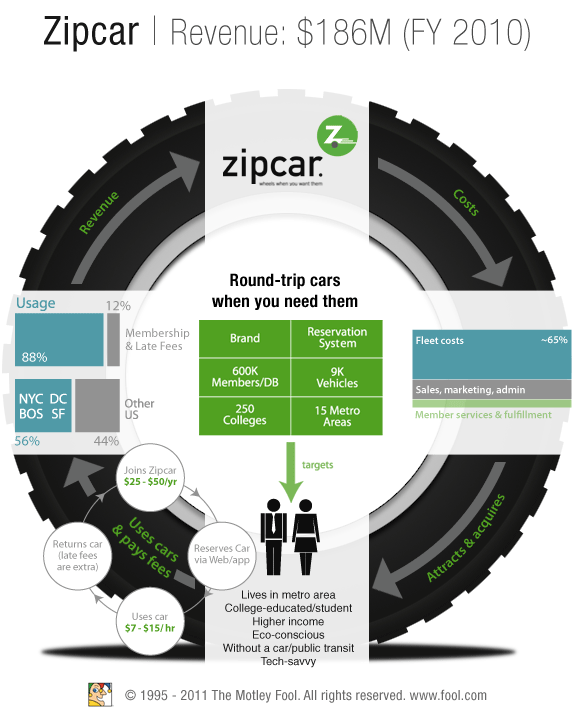The 1 Green Stock You Don't Want to Miss
If you live in or travel to one of the top 16 metropolitan areas in the country, then you may already be aware of this innovative enterprise. Zipcar (NAS: ZIP) is providing a cheap and convenient alternative to car ownership or rental. Pair that with a socially responsible purpose, and you have a company that is well-positioned for explosive growth.
Gang green
Since joining the "Zipster" community, I've been fascinated by the car-sharing business model, which is monopolized by Massachusetts-based Zipcar. Like many disruptive companies, its model is simple and elegant, yet transformative:

Zipcar has procured about 9,500 vehicles as well as centrally located parking spaces in metropolitan areas and college campuses throughout the United States. It attracts and acquires members who pay for annual membership (12% of total revenue) and usage (remaining 88% of revenue) through partnerships with companies such as Ford, paid advertising, and brand awareness (the branded cars are hard to miss). And it's growing fast -- from 2005 to 2010, annual membership has had a compound annual growth rate of 66%. During the same period, revenue has seen an even higher CAGR of 68%.
Studies estimate that there are more than 10 million drivers living within a 10-minute walk of a Zipcar, which values out to about a $3 billion North American market. That's a substantial upside in my book. You tack onto that our nation's growing awareness and marketability of green living, and this company seems like the "gang green" I wish my New York Jets more closely resembled.
Speaking of green... backs
Zipcar saves its members money and time. Most cars sit idle for nearly 22 hours a day. Compared to car ownership, members pay only for the time they are using the car; not time in the garage, not for the parking space, not for the gas, not for the maintenance, not for the insurance. According to Frost & Sullivan, depending on total distance driven, car sharing can save up to 70% of the total transit costs for its members. They only pay simple usage fees when they need to use a vehicle. And unlike car rental companies, Zipcar charges by the hour, not by the day. What's more, members can reserve vehicles from the comfort of their favorite Internet devices and walk to a nearby space to take their ride -- avoiding all of the lines and hassles of renting a car.
Although Netflix has had its share of problems lately, it is possible that Zipcar could do to Hertz (NYS: HTZ) and Avis (NAS: CAR) what Netflix has done to Blockbuster. Blockbuster clearly didn't adapt to societal and market trends very well. The entrenched company wasn't forward-thinking, despite the fact that it began the battle with thick pockets. Netflix wasn't profitable from the get-go, either. It had to build its stock of content -- just as Zipcar had to build its stock of cars. The large car rental companies could see the same fate as Blockbuster because they aren't putting their money toward modern technology and the trend toward self-service and responsible living the way Zipcar is.
The grass isn't always greener
Many investors are concerned that although Zipcar has great potential, last quarter was the first time it has ever posted a profit. That's fair.
Furthermore, traditional rental car companies have the means to give this company a run for its money. Hertz currently has a small program called "Hertz On Demand," which has no membership fees and offers one-way service, both of which Zipcar does not offer. Enterprise Rent-A-Car and U-Haul also have limited offerings in the form of WeCar and U Car Share, respectively, but their Web- and phone-call-based systems would make any Zipster cringe.
And let's not forget that many Americans dream of owning a car one day. Zipcar CEO Scott Griffith has said that personal car ownership is challenging because it's been part of the "American dream" for decades.
Finally, as we saw in the business model above, investing in cars and parking spaces is a capital-intensive endeavor. If interest rates begin to soar, the company could have trouble paying for its large fleet of vehicles and expanding its reach.
Count me in
Clearly, Zipcar has to overcome some financial and competitive hurdles. But one of the things that really sets this company apart from its competitors is that it is extremely passionate about its purpose, "to enable simple and responsible urban living." It has rapid growth goals and a plan in place to get there. With society trending toward "greener" living, it's hard for me to imagine a future where Zipcar's business model does not thrive.
At the time thisarticle was published Annie Feldman does not own shares of any company mentioned here, yet. The Motley Fool owns shares of Ford Motor, Hertz Global Holdings, and Zipcar. Motley Fool newsletter services have recommended buying shares of Zipcar, Netflix, and Ford Motor. Motley Fool newsletter services have recommended creating a synthetic long position in Ford Motor. We Fools may not all hold the same opinions, but we all believe thatconsidering a diverse range of insightsmakes us better investors. The Motley Fool has adisclosure policy.
Copyright © 1995 - 2012 The Motley Fool, LLC. All rights reserved. The Motley Fool has a disclosure policy.

